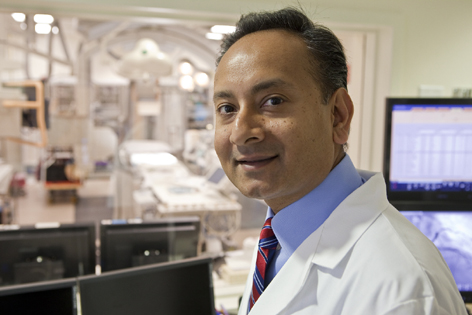
|
|
Heart disease: the No. 1 killer of U.S. women

Women don't seek treatment because they fail to recognize symptoms, experts say
- Heart disease is the No. 1 killer of women in the United States, claiming one life almost every minute.
- Nearly five times more women will die from heart attacks this year than those who will die from breast cancer.
- More women than men die from heart disease.
"Heart disease has traditionally been thought of as a man’s disease," explains Dr. Pranav Patel, a cardiologist and interim chief of UC Irvine’s Division of Cardiology. "That perception is beginning to change in the medical field, but we need more awareness in the general public."
The problem is that women aren't as aware of the signs of heart disease, which can differ significantly from those experienced by men. "They fail to recognize the symptoms and they fail to seek treatment," says Dr. Afshan Hameed, a UC Irvine Healthcare cardiologist and maternal-fetal specialist.
Evidence shows that women's heart attack symptoms are different from men's. Though chest pain is still considered the most common symptom for both men and women, studies suggest that women don’t always have severe chest pain, or that they don’t recognize it.
"Women also may experience indigestion, jaw pain, extreme fatigue or nausea as symptoms. Most people don’t think of these as signs of heart disease," says Hameed.
Another misconception is that only older women are at risk. Hormones, specifically estrogen, do give women protection in their early years, but heart disease can affect women as young as 30 years of age. Arterial plaque can start accumulating as early as childhood and adolescence.
"It’s never too early to start reducing your chance of developing heart disease by knowing your risk factors and making healthy lifestyle choices," says Patel. "Even young and middle-aged people can develop heart issues—especially now that obesity, diabetes and other risk factors are becoming more prevalent at a younger age."
UC Irvine cardiologists treat thousands of patients each year for all types of cardiovascular disease, ranging from the common to the rare. UC Irvine doctors and researchers are studying gender-related differences in the treatment of heart disease with the goal of developing recommendations to help customize care for women. Nearly half of UC Irvine’s cardiologists are women.
Heart attack symptoms in women include:- pain, pressure or discomfort in the chest
- neck, jaw, shoulder, upper back or abdominal discomfort
- shortness of breath
- nausea or vomiting
- sweating
- lightheadedness or dizziness
- unusual fatigue
Hameed, a rare specialist in both cardiology and maternal-fetal medicine, treats women with heart disease who want to become pregnant. She also treats pregnant women who may be at risk for heart disease.
"Women of all ages need to be aware of the signs of heart disease," she says. "And if they are experiencing heart attack symptoms, they need to go the emergency room immediately."
For more information or to make an appointment, please call the Cardiovascular Center at UC Irvine Medical Center at 714.456.6699.